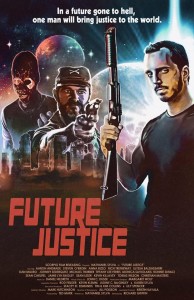Rhode Island director Richard Griffin premiered his new film Future Justice that has the look of a movie with a $10 million dollar budget, despite the real budget being a lot closer to $10,000.
 Director Richard Griffin, perhaps Rhode Island’s most enthusiastic devotee of 1970s genre cinema, pays homage to the post-apocalyptic thriller in his most recent Future Justice that premiered at Lincoln Mall Cinemaworld on Sunday, May 18, to a sold-out house.
Director Richard Griffin, perhaps Rhode Island’s most enthusiastic devotee of 1970s genre cinema, pays homage to the post-apocalyptic thriller in his most recent Future Justice that premiered at Lincoln Mall Cinemaworld on Sunday, May 18, to a sold-out house.
Striving to be as prolific as Roger Corman – a director with whom he would no doubt be honored to be mentioned in the same sentence – Griffin, under his independent Scorpio Film Releasing company, has directed his own simmering survey of schlock that is more entertaining than any film studies course, ranging from early romps with monsters (Creature from the Hillbilly Lagoon, 2005), thinly disguised political satire imagining a Buddy Cianci-like mayor as a vampire (Pretty Dead Things, 2006), and the “all-singing, all-dancing, all-dead” splatter musical (Splatter Disco, 2007), to more “mature” efforts – if that word can properly be applied to any Griffin film – involving Lovecraftian horror (Beyond the Dunwich Horror, 2008), nun-sploitation (Nun of That, 2009), and a disco-dancing womanizer simultaneously fending off a voodoo curse, nose candy and a lot of topless women (The Disco Exorcist, 2011).
In Future Justice, screenwriter Nat Sylva plays legendary political revolutionary “Python Diamond,” who is being transported back to earth in a military spaceship. Upon arrival, the crew discovers that the reason they were unable to communicate with their base is that a devastating war has occurred, leaving Asia completely uninhabitable and causing enough damage to North America that the few survivors are desperately foraging for food and shelter in a post-apocalyptic society where governments and laws have been wiped away. The fascination with the tropes of violent action-adventure apparently shared by Sylva and Griffin makes Walking Dead seem like a wimpy soap-opera by comparison.
Griffin enlists much of his usual repertory company of actors and regular collaborators, including musician-composer Daniel Hildreth and special-effects wizard John Dusek, to make a very tight drama that has the look of a movie with a $10 million budget, despite the real budget being a lot closer to $10,000. Early scenes of the spaceship in flight, while obviously computer-generated, look as good if not better than any similar scenes laid onto film prior to 2001: A Space Odyssey from 1968. The score is also impressive, evoking the sound of a 1970s view of the future. The film also perfectly nails the sets and props, among the hardest challenges in this kind of genre piece. Much of the film was shot on location in Pawtucket, making extensive use of its old mills and factories.
The commander of the military spaceship (Aaron Andrade) is committed to a life of hierarchical order and cannot understand or accept its disappearance. Diamond, having led a revolutionary force whose allegiance to him was a matter of choice, quickly realizes that he is more suited to the realities of the new situation than the commander. The crew (Dan Mauro, Tiffany Lee Ferris, Ronnie Suraci) begin to realize this as well, especially one of them (Elyssa Baldassarri), as the commander makes increasingly risky and inhumane decisions.
Eventually a crisis is reached as the crew takes refuge with some friendly survivors (Rich Tretheway, Anna Rizzo, Johnny Sederquist, Monica Saviolakis, Michael Thurber, Sean Leser, Sean Carufel, Jamie Lyn Bagley), one of whom has mentally collapsed into a childlike state (Casey Wright). They are threatened by a marauding band (Tobias Wilson, Christian Masters, Kevin Killavey) headed by the strangely named – and strangely spelled – “Gazeebo” (Steven O’Broin), who enlists the aid of an experienced thief and salvager disguised as a bag lady (Patricia Hawkridge). Eventually, yet another threat (Patrick Keeffe) appears who forces the former combatants to cooperate.
In a bit under an hour and a half, Griffin delivers some pretty amazingly solid entertainment that is surprisingly original for the post-apocalyptic genre, essaying neither the overly cerebral (La Jetée and everything influenced by it, from its remake 12 Monkeys to the Terminator series) nor the rehashed Western (the Mad Max series). A tolerably credible plot that avoids deus ex machina conventions of the genre, along with strong characters and a stellar performance from Sylva, turn in an enjoyable film that knows from the outset that it is not in contention for the Best Picture Academy Award, not even from 1979.
Python Diamond is a great character, an ambiguous hero whose intelligence and skills everyone acknowledges despite their own mistrust and hatred of him, and he has the potential to become the basis for a franchise if Sylva and Griffin are inclined to pursue a sequel. It’s technically a spoiler to say that Diamond survives at the end, but if you’re surprised by that single most obvious plot development, then you have no business watching this movie in the first place.
Future Justice pre-orders for DVD/Blu-ray discs, expected ship date June 30, 2014: scorpiofilmreleasing.squarespace.com/dvds/
More Posts by The Author:
Defending the Electoral College
Halloween 2024 Weather Forecast: Unusually warm but ideal for trick-or-treat
Cannabis Status: Update on expungements, taxes
Existing is a Lot: A “F— Cancer” fundraiser
Severe Thunderstorm, Flash Flood Warnings: Reports of 1-inch diameter hail


